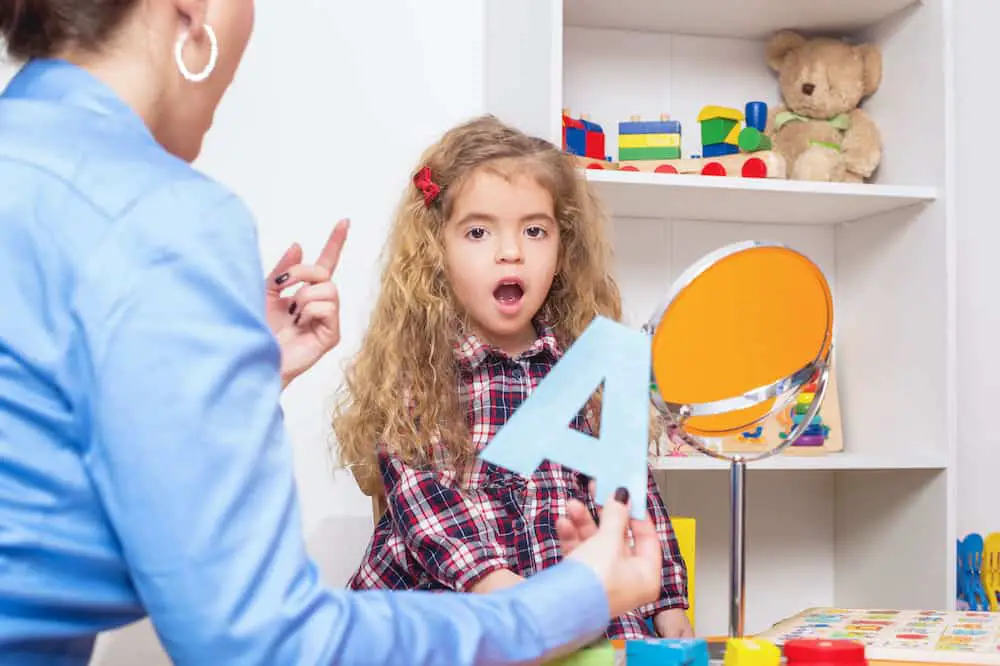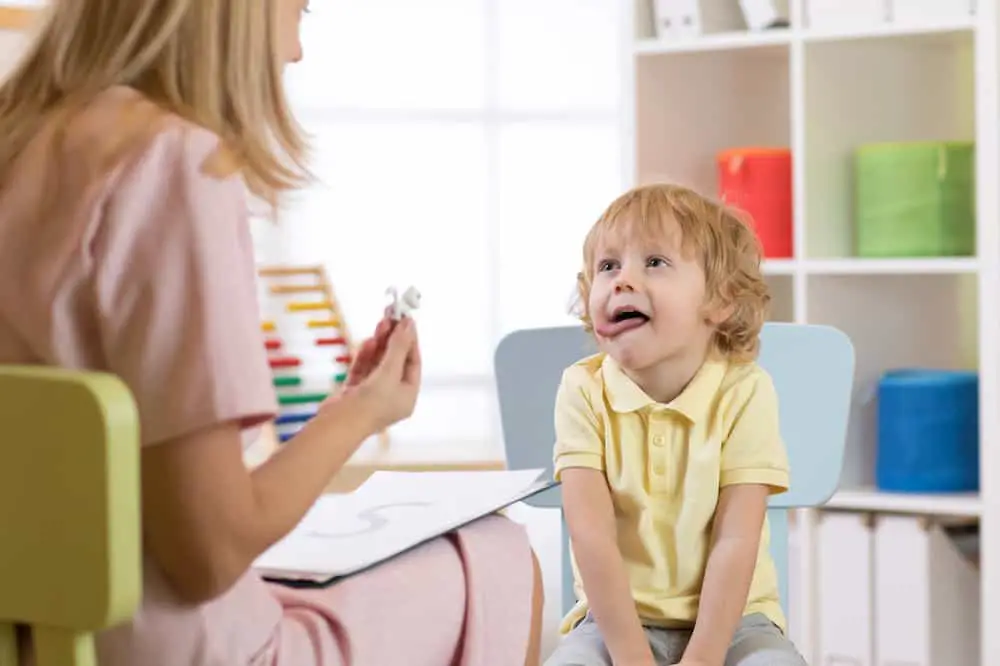Worried about your child suffering from speech or articulation delay?
There are lots of activities that may help their progress.
You may be surprised to know this, but even the simplest games and objects will help inspire your little ones into talking.
You just need to get creative at home and make learning fun to engage them in sneaky at-home therapy sessions.
Today, we’re going to look at the importance of early intervention and recommend some ideas for early intervention speech therapy activities you can do at home.
Why Is Early Intervention Important for Speech and Language?
Speech problems can sometimes lead to behavioral problems due to your child’s frustration at not being able to communicate.
Research also suggests that early intervention can help support the skills needed for reading and writing later down the line.
What Does Early Intervention Do for Speech?
Early intervention could help eliminate articulation errors and improve brain development, as well as enhance your child’s ability to communicate overall.
It can also give you, the parent or carer, more control.
Eliminate Articulation Errors
The first way that early intervention could potentially improve your child’s speech is to eliminate articulation delays.
Correcting articulation errors earlier is shown to be much more effective than trying to fix them later.
Improve Brain Development
Speech and language skills are developed most when your child is between three months and three years old.
Because infant and toddler brains can assimilate information much faster, you must take advantage of this time.
You would want to teach them as much as possible during this faster-learning period of their lives.
Improve Communication
Early intervention can also help improve your child’s overall means of communicating.
The earlier they learn to speak, the earlier they will also learn to interact with others in play situations, as well as with adults and peers.
Children who aren’t able to communicate verbally can be set compensatory strategies to help them express themselves in other ways.
Teaching a child American sign language or giving them picture cards to use will allow them to communicate with you and others.
It can help reduce potential frustration at not being able to communicate while verbal aspects of language are developed further.
Gives You More Control
Early intervention speech therapy will also give you the knowledge and tools you need to help you feel more in control.
As parents or carers, you play a crucial part in your child’s speech and language development as their primary language role models.
Early intervention speech therapy will teach you strategies to use in your daily life to help ease your child into speaking.
Early Intervention Speech Therapy Activities
Early intervention speech therapy relies heavily on parents being more involved with their child’s speech and language development.
Depending on your child’s speech problems, it can make a huge difference in their future ability to communicate.
Early intervention also impacts both their academic and personal lives in the future.
Still, all children learn at their own pace, and if your child isn’t talking as quickly as the other kids, it’s not necessarily something to worry about.
Early intervention is recommended over a “let’s wait-and-see” approach for many reasons.

Speech Therapy Activities for You To Try at Home
There are lots of ideas for speech therapy activities you can try at home with your child, and it’s never too early to start.
Infants Zero to One-Year-Old
When your child is in infancy, it’s important to talk to them often, even though they are not yet talking back.
Take them for walks in their stroller and talk about all of the things you can see together, leaving pauses in the conversation for them to “answer.”
You can talk about the colors you see, the trees, birds, flowers, or dogs running around the park.
They will enjoy listening to the sound of your voice and will learn instinctively about how conversations flow back and forth.
They may also start babbling in the appropriate places, so you can tell that they are trying to be involved.
Lay a blanket on the grass or floor and give them some tummy time while you talk to them, read a story, or sing to them.
Music and songs will also help you learn more about their speech comprehension, especially as they get older.
The repetition will help them learn and recognize melodies and even some words.
You may notice their excitement as you start to sing one of their favorite songs.
Incorporating actions also builds anticipation for a moment in the song when they know you’re about to swing them around or tickle them.
Teaching them simple sign language for words like “more” and “finished” can also help them learn to express themselves to you earlier.
Children as young as eight months are sometimes able to remember and perform very simple signs.
Studies have also shown that teaching sign language to babies when they are preverbal can help to speed up speech development.
Toddlers One to Three Years Old
Talking, reading, and singing with your child should be kept up throughout their early years of development and beyond.
Invest in some inexpensive toys to use as props in your activities together.
We recommend some miniature vehicles you can take on “drives” together (after you say “ready-steady-go,” of course).
Small plastic animals are also great because of the sound effects you can create together when playing with them.
You can encourage your child to make the sound effects of the vehicles and animals before later moving on to their names and action words.
What’s more, never underestimate the power of bubbles. Even if all else is failing, bubbles just might be able to save the day.
Blowing bubbles with your toddler will not only mesmerize them but also help them practice their “b” and “p” sounds as the “bubbles” go “pop.”
Preschoolers Three to Five Years Old
Turn your pillowcase into an endless source of amusement by filling it up with “mystery” items.
There is literally so much you can do with just a pillowcase.
Have your child stick their hand in the pillowcase and see if they can guess what’s inside before naming the object and pulling it out.
Stick to easy and familiar objects so that they can win easily and feel accomplished.
Playing with different colored balls can provide lots of entertainment, too.
You can sort them out into colors, count them, and play with them.
You can try asking them the ball’s color or requesting a specific color to be rolled or thrown across the room to you.
The balls can even go in the pillowcase as you ask, “Can you guess which color I’m going to pull out next?”
If you have some picture flashcards at your disposal, you can also try and hunt for objects that match the pictures on the cards.
Doing this will help encourage language comprehension and articulation as you say each new word together.
Alternatively, you can collect some items together and put them in a box.
Show your child a series of flashcards to which they can match the picture they see with an object from the box.
You can have all of the objects in the box start with the same letter and label the box with that letter (the “d” box with dog, dolly, and dinosaur in it).
That way, you’re helping prepare your child for school as they also learn about phonetics.
Remember to always show enthusiasm for your child, whether it’s to show them how well they are doing or for at least trying!
Related: Speech Therapy Activities: Language Development and Fun Learning for Children
Early Learning Fun
If an activity that you and your child do together involves talking, listening, singing, reading, or playing, then it will be good for their speech development.
Some children get bored more easily than others, but holding their attention can be as simple as changing your location in the home.
Don’t forget that your child has a lot of energy to expend.
So, even if you’re feeling tired, try to think of games that will have them running or jumping around.
It’s important that you keep early intervention speech therapy activities fun to make the biggest impact on your child’s learning and development.

